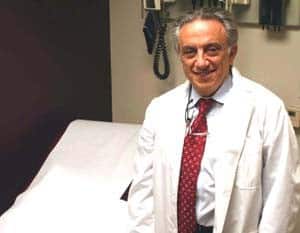Scientist Fights Infection Common in Myeloma Patients
| Dec. 21, 2010 | Most people breathe in spores of the aspergillus fungus every day. But for those being treated for certain kinds of cancers, including multiple myeloma, the fungus can lead to a potentially fatal infection. Myeloma researcher Elias Anaissie, M.D., hopes a clinical trial now under way could lead to more effective treatment for the invasive aspergillosis infection. In the process, he believes his use of a blood test shown to allow better diagnosis and tracking of aspergillosis will improve the way clinical trials are conducted on the infection. “This study may represent a new era in the treatment of aspergillosis,” Anaissie said. Infections caused by the aspergillus fungus rarely occur in people with a normal immune system. Invasive aspergillosis occurs almost exclusively in people with weakened immune systems due to cancer or cancer treatments that lower the number of normal white blood cells. In those patients, the infection is a significant cause of severe illness and death, Anaissie said, despite the availability of antifungal treatments. “Aspergillosis is a difficult disease,” said Anaissie, professor of medicine in the UAMS College of Medicine and director of supportive care in the Myeloma Institute. Past trials have been conducted on response to symptoms or tracking the response via X-rays.” Anaissie said the symptoms – fever, cough and the types of responses that show up in an X-ray or bronchoscopy – are often too non-specific to make a definitive diagnosis of the disease and to follow response to treatment. In many cases the infection becomes too far along before a diagnosis is possible and patients will succumb to the infection or some other cause (their cancer or another infection). The key for the new clinical trial was the novel application of a diagnostic test for aspergillosis. The test is based on detected aspergillus antigen in the bloodstream when invasive aspergillosis is present. The antigen is sensitive and specific for the infection, Anaissie said, and also allows researchers to track the effectiveness of treatment. “Within 24 hours we would know if the patient is responding to treatment thanks to the antigen,” he said. Anaissie and collaborator Marisa Miceli, M.D., detailed plans in 2009 for how a clinical trial taking advantage of the antigen could proceed in “Clinical trial design for invasive aspergillosis: time to cast a different mold” in a 2009 issue of the journal Medical Mycology. Anaissie said development of the antigen marker for invasive aspergillosis not only allows for testing treatments for the infection but for using methods that could expedite regulatory approval of effective treatments. The new clinical trial at UAMS is recruiting patients with multiple myeloma – with invasive pulmonary aspergillosis. They will be treated to determine whether combining two antifungal drugs known to be to be effective against aspergillosis is better at controlling the infection than using only one of the two drugs. Neither the patients nor the researchers will know which patients will receive each treatment in the randomized, double-blind study. Randomized clinical trials normally take several years and are expensive. In their 2009 journal article, Anaissie and Miceli proposed using the antigen marker for better diagnosis and outcome evaluation. The focus of the trial will be on multiple myeloma patients treated successfully with chemotherapy or a bone marrow transplant and at risk for aspergillosis. That focus will provide better patient selection — with those most at risk — and offer a more statistically robust trial. The aspergillosis infection rate is about 5 percent, Anaissie said, and some patients are treated for fungal infections when it’s not needed. Finally, the researchers will use a research method known as adaptive trial design, intended to allow selection of the most vulnerable patients and a quicker outcome evaluation. Researchers can adapt the study as it evolves to ensure statistical significance, reduce the length (and thus cost) of the study, and reduce exposing patients to drugs they do not need. “This strategy is likely to expedite approval of life-saving therapies for this serious disease,” Anaissie said. He expects the trial to continue for a year-and-a-half to two years. To find out about clinical trials going on at UAMS, visit uamshealth.com/clinicaltrials. |
